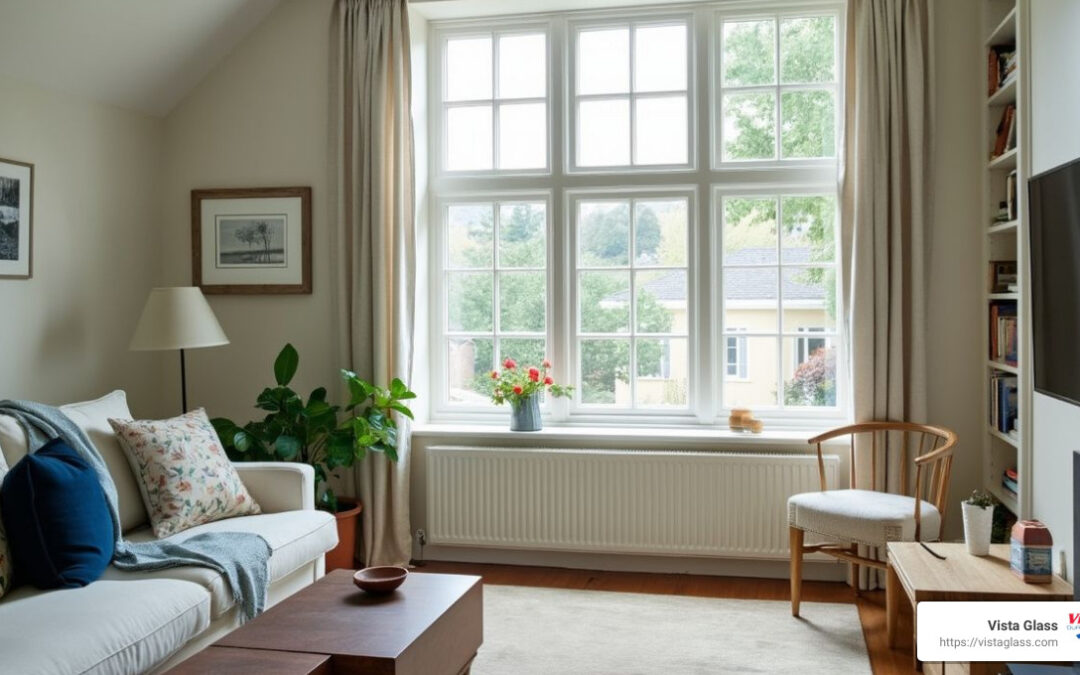Best Residential Windows: Top 4 Proven Picks 2024
When it comes to enhancing your home, best residential windows offer a trifecta of benefits: improved energy efficiency, increased curb appeal, and comfort. High-quality windows not only improve your home’s appearance but also help regulate indoor temperatures, lowering energy bills.
For those searching for the top choices quickly:
- Energy Efficiency: Look for Energy Star-certified windows with features like triple-pane glass and low U-factor ratings for maximum savings.
- Curb Appeal: Opt for windows that complement your home’s architecture. Modern black frames or slimline designs deliver a stylish aesthetic.
- Comfort & Quality: Select materials like fiberglass or composite frames for durability and reduced maintenance.
I’m Rich Main, the founder of Vista Glass. With over two decades in the glass industry, I specialize in helping homeowners choose the best residential windows for both style and efficiency.

Essential best residential windows terms:
– best glass for home windows
– house tempered glass window
– tinted window glass for house
Types of Residential Windows
Choosing the right type of window for your home can be a game-changer. Let’s explore some of the most popular options, each offering unique benefits and styles.
Casement Windows
Casement windows are hinged on one side and open outward with a crank. They provide an unobstructed view and excellent ventilation. When closed, they seal tightly, making them more airtight than some other styles. This feature makes them ideal for energy efficiency, especially in areas with harsh weather conditions. However, keep in mind that they are not suitable for window air conditioners.
Double-Hung Windows
Double-hung windows are a classic choice found in many homes. They have two sashes in a single frame, with the lower sash sliding up and the upper sash sliding down. This design improves air circulation and makes cleaning a breeze, as many models allow the sashes to tilt inward. Double-hung windows are versatile and can accommodate window air conditioners, though installation may require some adjustments.
Awning Windows
Awning windows are hinged at the top and open outward. This design is perfect for rainy climates, as the window acts like a small roof, keeping rain out while allowing fresh air in. The tight seal when closed improves their energy efficiency. Awning windows are often used in bathrooms and kitchens for ventilation, but they can be a stylish choice for any room.
Fixed Windows
Fixed windows are non-operable and are used primarily for lighting and architectural appeal. They come in various shapes and styles, including decorative glass options. While they don’t offer ventilation, their airtight nature makes them excellent for energy efficiency. Fixed windows are often paired with operable windows to create a balanced design that combines functionality with aesthetics.

Each window type offers distinct advantages. Whether you prioritize ventilation, energy efficiency, or design, there’s a window style that will meet your needs.
Next, we’ll dig into the Best Residential Windows for Energy Efficiency, exploring how to maximize savings while keeping your home comfortable year-round.
Best Residential Windows for Energy Efficiency
When it comes to maximizing energy efficiency in your home, selecting the right windows is crucial. Here’s what you need to know about the best residential windows for energy efficiency.
Energy Star Certification
Energy Star-certified windows are a top choice for homeowners looking to reduce energy costs. These windows meet strict guidelines set by the U.S. Environmental Protection Agency, ensuring they provide superior insulation and reduce heat transfer. In fact, nearly 92% of homeowners surveyed said that Energy Star certification was important to them. This certification can lead to noticeable savings on your electricity bills, as over 78% of homeowners reported reduced costs after upgrading to Energy Star windows.
Triple-Pane Glass
For those living in regions with extreme temperatures, triple-pane glass windows are a smart investment. These windows consist of three layers of glass, offering improved insulation compared to double-pane options. The additional pane helps to trap heat during winter and keep it out during summer, making your home more comfortable year-round. Plus, the extra layer can also reduce noise, providing a quieter indoor environment.
Understanding U-Factor
The U-factor is a key metric to consider when evaluating window efficiency. It measures how well a window insulates, with lower values indicating better performance. For instance, in northern climates, ENERGY STAR recommends windows with a U-factor of ≤ 0.22 to 0.26 for optimal insulation. This means that less heat will escape your home in winter, keeping your heating bills in check.
Solar Heat Gain Coefficient (SHGC)
The Solar Heat Gain Coefficient (SHGC) measures how much solar radiation a window allows to pass through. A lower SHGC means less solar heat enters your home, which is particularly beneficial in warmer climates. For example, in southern regions, ENERGY STAR recommends windows with an SHGC of ≤ 0.23 to minimize cooling costs during the summer months.
By focusing on these factors—Energy Star certification, triple-pane glass, U-factor, and SHGC—you can select windows that not only improve your home’s comfort but also significantly lower your energy bills.
Next, we’ll explore How to Choose the Best Residential Windows, covering cost considerations, installation, materials, and style options.
How to Choose the Best Residential Windows
When selecting the best residential windows for your home, it’s important to consider several factors that can impact both your budget and the overall aesthetics of your house. Let’s explore the key areas you should focus on:
Cost Considerations
Window costs can vary widely depending on the type, material, and features you choose. For instance, a large bay window will generally cost more than a standard double-hung window. According to research, double-hung wood windows can be around $300 more expensive than aluminum ones. It’s crucial to balance your budget with the features you need. Prioritize energy efficiency and durability over aesthetic extras if cost is a concern.
Installation
Proper installation is crucial to ensure your windows perform well and last long. We recommend hiring a contractor approved by the manufacturer. This way, if any issues arise, you won’t get caught in a blame game between the installer and the manufacturer. Some companies offer in-house installation, which simplifies the process as everything is handled under one roof. This can be especially beneficial for warranty claims.
Materials
The material you choose for your window frames can affect both the price and performance. Here’s a quick overview:
- Vinyl: Common and affordable, but may look less authentic.
- Aluminum: Sleek but not very energy-efficient.
- Wood: Offers classic appeal and better insulation but requires more maintenance.
- Fiberglass: Highly durable and energy-efficient, though more expensive.
For bathrooms or humid areas, non-porous materials like vinyl or fiberglass are recommended to avoid water damage.
Style Options
Windows come in various styles, each offering different benefits:
- Casement Windows: Hinged at the side and open outward, providing excellent ventilation.
- Double-Hung Windows: Feature two sashes that move up and down, allowing for versatile ventilation options.
- Awning Windows: Hinged at the top and open outward, great for rainy climates as they can be left open during showers.
- Fixed Windows: Do not open, ideal for areas where ventilation isn’t needed but natural light is desired.
Consider the architectural style of your home and the specific needs of each room when selecting window styles.

By weighing these factors—cost, installation, materials, and style—you can make an informed decision that improves your home’s beauty, comfort, and efficiency. Next, we’ll answer some Frequently Asked Questions about Residential Windows to address common concerns and help you make the best choice.
Frequently Asked Questions about Residential Windows
Which windows are best for energy efficiency?
When it comes to energy efficiency, triple-pane glass windows are a top choice. They offer superior insulation by creating two layers of airspace, which helps keep your home warmer in the winter and cooler in the summer. This means you’ll likely see a reduction in your electricity bills, as many homeowners have reported after upgrading their windows.
In addition to triple-pane glass, look for windows that are Energy Star certified. These windows meet strict energy performance standards set by the U.S. Environmental Protection Agency. Homes with Energy Star-certified windows can experience significant energy savings and improved comfort. Plus, they often come with rebates and incentives, making them a smart financial choice.
What is the longest-lasting window material?
Fiberglass is the go-to material if you’re looking for longevity and durability in residential windows. Unlike wood, which can warp and rot over time, fiberglass is resistant to moisture, warping, and fading. This makes it a perfect choice for areas with extreme weather conditions.
Fiberglass windows can last over 30 years without losing their structural integrity or aesthetic appeal. While they might be more expensive upfront compared to other materials like vinyl or aluminum, their long lifespan and minimal maintenance requirements often make them a cost-effective option in the long run. Plus, they offer excellent energy efficiency, making them a great all-around choice for your home.
By choosing the right windows, you can improve your home’s energy efficiency and ensure long-lasting durability. Up next, we’ll explore more about Vista Glass’s commitment to customer satisfaction and mobile service offerings.
Conclusion
At Vista Glass, we pride ourselves on delivering top-notch service and ensuring our customers are always satisfied. With over 25 years of experience in the glass industry, we understand the importance of quality and reliability when it comes to choosing the best residential windows for your home.
Our mobile service stands out as a unique offering, bringing our expertise directly to your doorstep. Whether you’re in need of window repair or replacement, our team of skilled professionals is ready to provide convenient, efficient, and high-quality service wherever you are. This mobile approach not only saves you time but also ensures that your windows are installed or repaired with minimal disruption to your daily routine.
Customer satisfaction is at the heart of everything we do. We believe in providing personalized solutions that cater to the specific needs of each homeowner. Our commitment to excellence is reflected in the positive feedback we receive from our clients, who appreciate our attention to detail and dedication to getting the job done right the first time.
For those in Tucson and the surrounding areas, Vista Glass is your go-to partner for all your residential window needs. We invite you to explore our comprehensive range of services and find how we can help you improve the beauty and efficiency of your home.
Learn more about our services and get in touch with us today!

